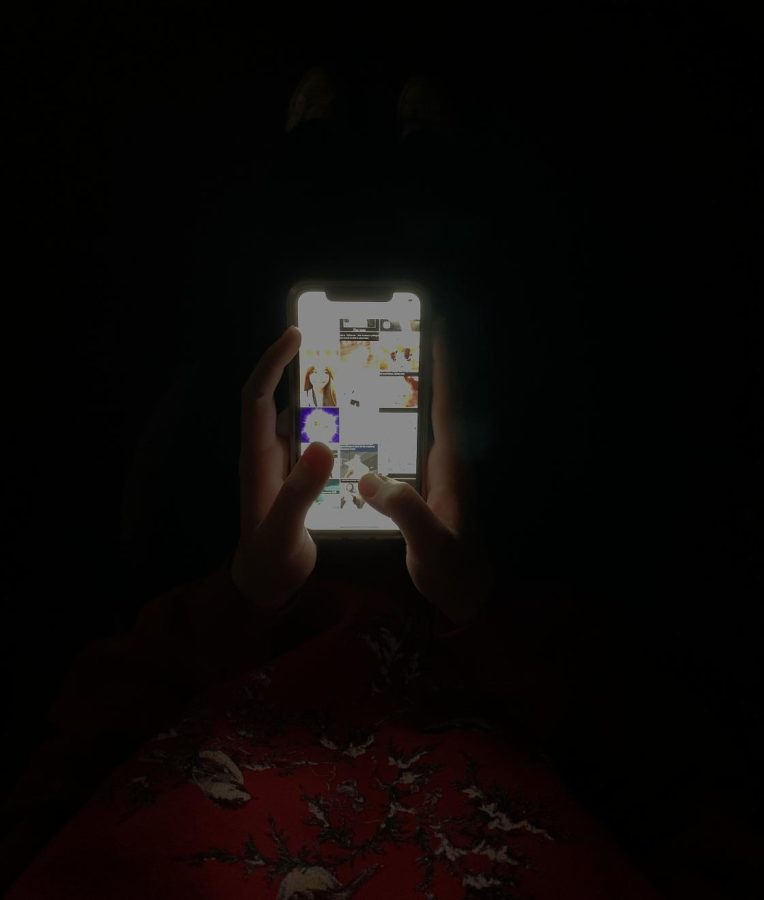A new pandemic is here and you’ve all tested positive
Sr. Kira Guerrin scrolling through her Instagram explorer page
December 6, 2022
Right after a quarantine’s worth of time scrolling through Instagram, Tiktok, and other social media platforms, being closed away from the outside world, I felt not only empowered by the ideas and strong opinions that were presented to me, but solidarity with the people who agree with me and disagree with “the enemy.” The second that I, and other people in my generation, returned to school, we were hit with the harsh reality that not everyone thinks the same as our social media “families.”. I felt like I was surrounded by crazy people, and I’m sure others felt the same about people like me. Looking back, I can say with confidence that I suffered from being “chronically online.”
Definition of chronically online
Being chronically online is something that many people in today’s current society suffer from. Most people experienced this in the year 2020 during the COVID pandemic. This “disease” is a result of people being on social media so much that they lose all touch with reality. It’s not only the people’s fault. Technology has advanced enough to give its users algorithms. These algorithms figure out exactly what the users want to see, and give them only that. Humans have forgotten how to have civil discussions with people who have opposing viewpoints. They only know how to interact with those who agree with them on social media. They don’t remember how real people act in real life.
How do people view this issue?
After living in a society with many victims of this internet illness, it’s easy to feel that there are few left with “normal” thoughts. Rest assured, this is not the case. Because of the seemingly large amount of chronically online people, it can be scary to voice your opinion, but deep down many people might agree with the wise words of 32 year old Zeeland resident, Alyssa Davis, “I think that everybody goes through periods of their day, whether it’s an hour or twenty minutes where everything else in the world shuts off, and I would consider them to be chronically online. They’re completely consumed, down a rabbit-hole of memes or reels or whatever where they’ve completely lost touch with reality.” Davis continues to talk about how her periods of being chronically online affected her. “With COVID and having a 6 month old and feeling so trapped in the house, 100% I was chronically online for that full year.”
Symptoms
Political extremism: A psychology term, group polarization, explains why this is a common result. When put into groups of people with similar views, it’s easy to get swept up in the heat of the mob and spiral towards extreme ideas. Because social media shows its consumers almost exactly what they want to see, these people’s ideas and opinions spiral into something stronger, and it can be a harmful setup for relationships they may want to make with people who have different opinions.
Loss of identity: People already spend too much time curating their perfect online image. When people are confined to social media apps for long periods of time, that “online image” becomes who they also try to be in real life.
Non-diverse friend groups: Because the algorithm of online platforms puts people with similar ideas and demographics together, users minimize their horizons of who they want to be friends with and who they’ll accept as their friend.
It’s also important to take into consideration that the likelihood of contracting this disease seemingly goes up for people who fall into one specific age group: Generation Z. Alyssa Davis said, “I think anyone in high school right now, figuring out what you want to do with your life and seeing people online that are famous just for being online and repping brands and being paid advertisers and promoters of things, I feel like it is easy to drink that Kool-aid and I think that, especially going into a pivotal time in life and your educational career and not being able to be in-person (COVID-19) screwed you guys over a little bit.” Soph. Kara Davis agrees.. “I think preteens and teens are the most chronic internet users. I get the privilege of working with many middle schoolers, and I am surrounded by high schoolers daily. I’ve noticed that the high schoolers are starting to act normal again, but I feel like middle schoolers are still very much chronically online. I have an inkling that 2020 made children miss out on some growth and maturing that comes with going outside.”
Cure?
Don’t fear, this disease isn’t terminal. In hindsight, Kara Davis can admit to being chronically online at one point in her life and has figured out her journey back to reality. “During the peak of the pandemic, like many, I spent my days aimlessly wandering the internet. This made me forget how people actually act in real situations, which made me forget how I should be acting in real situations. I was so chronically online in 2020.” She also says “Reintroducing ourselves and the people we care about to nature and society is important. Call me a hippie, but connecting with the Earth (dare I say “touching grass”) definitely helps our minds, bodies, and souls.”
Alyssa Davis made one very important point that people need to become aware of to get anywhere near a cure. “I think social media is an addiction in the same way that drugs and alcohol are an addiction, so is there a cure? Yes. Does it have to come from the person wanting to help themself? Yes, absolutely. You need to be willing to detox from your phone and social media. It almost needs to be a 12 step program where you need to realize you have a problem and then take the steps to recover.”
Though this is an issue that people still suffer from, it’s important to take into consideration the worldwide pandemic that restricted true human contact for an extended period of time. The COVID pandemic in turn caused an entirely new pandemic: chronic social media usage. Some people’s symptoms are just more long term than others. Society will surely move on from this widespread “illness”, it will just take a little time and a little human-to-human contact.






